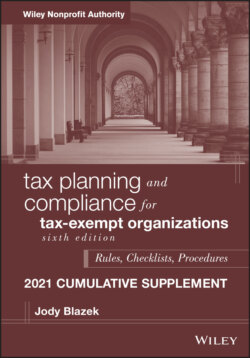Читать книгу Tax Planning and Compliance for Tax-Exempt Organizations - Jody Blazek - Страница 19
Application of Law
ОглавлениеYou are not described in IRC Section 501(c)(3) because you fail the operational test set forth in Treas. Reg. Section 1.501(c)(3)‐1(a)(1). Specifically, you are not operated exclusively for an exempt purpose as described in Treas. Reg. Section 1.501(c)(3)‐1(c)(1). The facts show that you are not operated exclusively for charitable purposes. You are operated to facilitate sales for the benefit of growers and producers at your farmers' market. For a fee, you provide space at which your vendor members sell their goods directly to the public. The fee covers the cost of marketing and your market manager. Your operations result in substantial private benefit to vendors of products at your market.
Treas. Reg. Section 1.501(c)(3)‐1(d)(1)(ii) requires an organization show that it is not organized or operated for private interests. Although your market includes educational information and you provide free space to nonprofit organizations, more than an insubstantial part of your activities are in furtherance of the nonexempt purpose of being a profitable outlet for your vendors to increase their sales. You not only provide the outlet for them to sell their products, you provide marketing and cover overhead expenses that the vendors would otherwise have to expend. Your activities provide a substantial private benefit to vendors. Therefore, you do not qualify for exemption under IRC Section 501(c)(3).
Treas. Reg. Section 1.501(c)(3)‐1(d)(2) provides the term “charitable” is used in IRC Section 501(c)(3) in its generally accepted legal sense and includes relieving the poor and distressed or the underprivileged, combating community deterioration, lessening neighborhood tensions, and eliminating prejudice and discrimination. You did not provide evidence that you limit your services to the poor and distressed, or that your operations are in a deteriorated or blighted area. While you do plan to offer some charitable services, such as giving space to local nonprofit organizations conducting programs related to public health, this is incidental to your operation of a market for the sale of goods.
Treas. Reg. Section 1.501(c)(3)‐1(d)(3)(i) provides, in part, that the term “educational” as used in IRC Section 501(c)(3) relates to the instruction of the public on subjects useful to the individual and beneficial to the community. While you will provide some educational services, such as offering information on government nutritional programs, this is incidental to your operation of a market for the sale of goods.
You are like the organization described in Rev. Rul. 69‐175 because you were formed by a group of vendors joining together to sell their products. Vendors pay a fee to participate in the market. By associating together and providing a cooperative service among themselves, your vendors are serving a private rather than a public interest.
Similar to the cooperative art gallery described in Rev. Rul. 71‐395, you provide a venue for selling items that advance private interests. As explained in the ruling, an organization that operates for the purpose of exhibiting and promoting the sales of products for the benefit of private individuals does not qualify for exemption under IRC Section 501(c)(3). Similar to the organization described in the ruling, you are not operated exclusively for charitable or educational purposes. Even though providing space to nonprofit organizations and offering educational information may be charitable and educational in some respects, it is not your primary purpose.
You are similar to the organization described in Rev. Rul. 73‐127 because the operation of the farmers' market, the granting of free space to nonprofit organizations, and the operation of an educational booth are three distinct purposes. Because the operation of your market is not an exclusively charitable or educational purpose, you are not operated exclusively for exempt purposes.
Your activities are similar to the management and marketing activities conducted by the organization described in Rev. Rul. 77‐111. Like that organization, by conducting advertising and marketing as well as managing the market facility, you are engaged in activities that promote business in the market place generally rather than accomplish exclusively charitable purposes described in IRC Section 501(c)(3).
As held in Better Business Bureau of Washington. D.C., Inc., a single nonexempt purpose, if substantial, will preclude tax exemption under IRC Section 501(c)(3). The operation of your farmers' market, a substantial part of your activities, is a nonexempt purpose.
You are similar to the organization described in Ginsberg. The primary beneficiaries of the activities of your market are your members who are selling their products. Any public benefit is secondary to the sale of goods.
